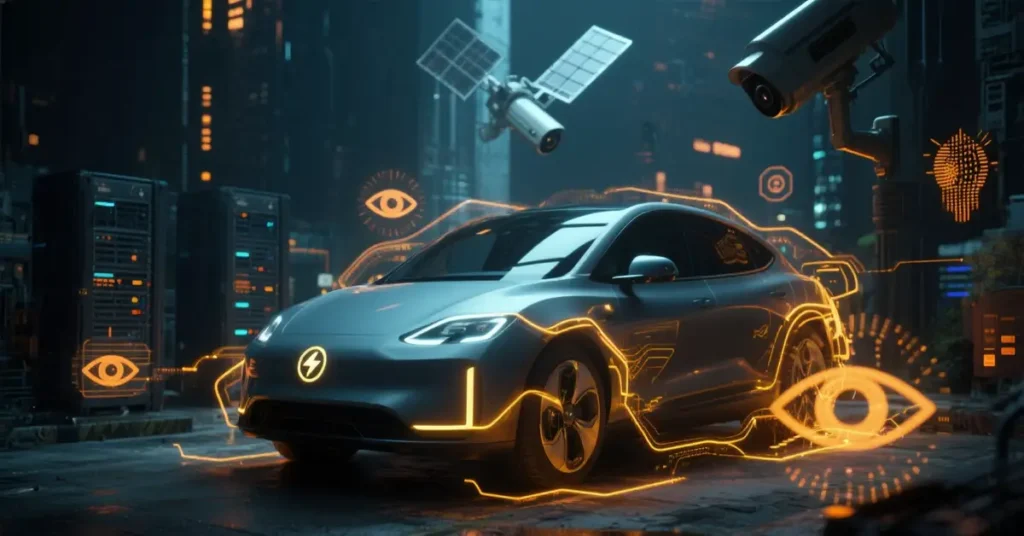Think Your EV Is Clean and Green? It Might Be Watching You.
Electric vehicles are hailed as the future of clean mobility. But there’s a growing concern no one’s talking about: your EV might be leaking more than just data it could be exposing your identity, habits, and private life.
Recent cybersecurity studies show that your EV’s battery usage patterns can reveal more about you than your phone ever could. Using only power consumption data (no GPS, cameras, or cloud connection), machine learning algorithms have been able to:
- Identify who is driving
- Track where they’re going
- Detect how they drive
- Estimate passenger count
- Reconstruct daily routines
This research led by the University of Trento and TU Wien used real EV datasets to build a method that reached up to 95.4% accuracy in identifying drivers and behaviours from battery-only data. That means someone could spy on you without ever hacking your GPS or logging into your account.
How Battery Data Becomes a Privacy Goldmine
Let’s break it down:
1. Battery “Power Profiles” = Driver Fingerprints
Each time you hit the accelerator, brake, or switch on the A/C, your EV’s battery draw shifts subtly. Over time, these patterns create a unique “power signature” for you as a driver like a digital fingerprint.
2. No GPS Needed Just Voltage and Time
All an attacker needs is access to raw voltage, current, and timestamp data. This is often available to service centers, charging stations, apps, or through exposed APIs.
3. AI Makes It Worse
What would be just noise to a human becomes a goldmine for AI. Neural networks can decode seemingly random power data into recognizable behaviors, routes, and even user identity.
Real-World Examples of EV Data Exploits
| Year | Vehicle/Brand | Privacy Threat | What Happened |
| 2024 | Generic EVs (research) | Battery-side channel attack | Researchers showed EVs could be tracked using only power data. |
| 2023 | Tesla | Remote disabling (“bricking”) | Public chargers manipulated charge data to lock out users. |
| 2022 | Nissan Leaf | Data API leak | Anyone could access location and battery usage without login. |
| 2021 | BMW i3 | Charging station profiling | Charge habits revealed home/work routines and commute patterns. |
Who Can Exploit This?
- Hackers: Via unsecured chargers or over-the-air vulnerabilities
- Data Brokers: Through app permissions or charging networks
- Insurers: Adjusting premiums based on “aggressive” driving
- Employers: Tracking employee location without consent
- Governments: Conducting surveillance without traditional tracking tools
Six Ways to Protect Your Privacy from EV Battery Spying
Here’s what you can do as an EV owner today:
Audit App Permissions
Uninstall or restrict third-party car apps that don’t need full access to your EV data.
Disable Passive Data Sharing
Go into your infotainment or car companion app and disable telematics sharing where possible.
Avoid Public Chargers Without Encryption
Use secure, home-based charging stations when you can. Public chargers can log your activity.
Ask About Data Handling at Service Centers
If your workshop plugs into your EV, ask what data they access and how they handle it.
Use a Smart Charging Firewall (if available)
New home EV charging solutions include firewalls that restrict unnecessary data exposure.
Update Your Firmware
Manufacturers are slowly patching these vulnerabilities. Stay updated to avoid older security holes.
Industry Needs to Do More and Fast
While tech-savvy users can protect themselves, the real responsibility lies with automakers and infrastructure providers.
- OEMs must encrypt power consumption data at the hardware level
- Charging stations should anonymize logs before storage or transmission
- Regulations like GDPR and WP.29 need to extend to battery-level data protections
Right now, very few EVs implement such protections. The longer this goes unaddressed, the more users remain at risk.
What Researchers Are Saying
“We can uniquely identify a user across different sessions using only the power consumption data, achieving over 95% accuracy. Even occupancy can be inferred.”
Francesco Marchiori, University of Trento
“Unlike phones or GPS trackers, people trust their cars. This makes these attacks particularly dangerous.”
Dr. Mauro Conti, TU Wien
MotorHub’s Take on EV Privacy
At MotorHub, we believe technology should work for you not against you.
As EVs become smarter and more connected, we urge manufacturers, regulators, and service providers to build privacy-first infrastructure. Battery data may seem harmless, but it’s becoming the next frontier in surveillance and profiling.
We’ll continue covering EV developments, cybersecurity risks, and repair insights so you can drive confidently in a connected world.
Further Reading & Resources
- Leaky Batteries: A Novel Set of Side-Channel Attacks on Electric Vehicles (arXiv)
- CyberInsider Report on EV Privacy Breach
- EV Charging Station Risks (PMC)
- Survey on EV Security and Privacy (ResearchGate)
Whether you’re driving an EV through Dubai’s smart roads or charging up in Abu Dhabi, your vehicle’s data deserves protection. MotorHub empowers UAE car owners and workshops with knowledge that keeps you secure, informed, and always in control.
Want to stay ahead of automotive tech and privacy trends?
Visit www.motorhub.club for more informative articles, expert insights, and uncensored takes on the future of mobility.



